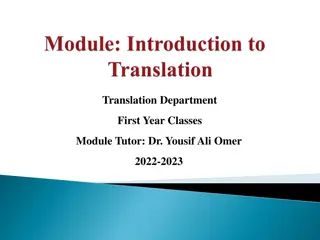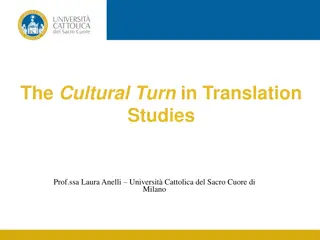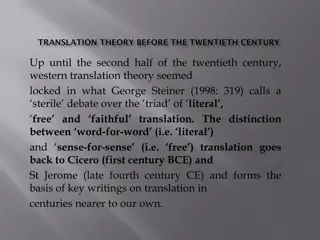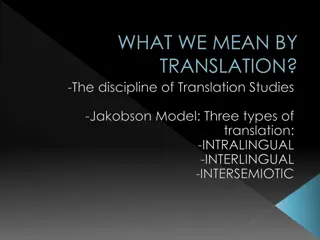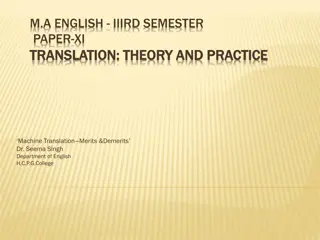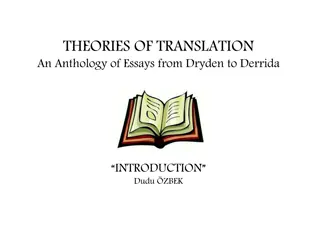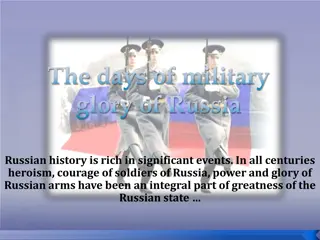Unveiling the Intricacies of the Russian Word "Toska" in Translation
Delve into the profound meaning of the Russian word "toska" through various translations and contextual interpretations, shedding light on the intricate nuances and language-specific expressions found in works by authors like Fyodor Dostoevsky. Explore the challenges and richness of capturing the essence of "toska" in different languages.
Download Presentation

Please find below an Image/Link to download the presentation.
The content on the website is provided AS IS for your information and personal use only. It may not be sold, licensed, or shared on other websites without obtaining consent from the author.If you encounter any issues during the download, it is possible that the publisher has removed the file from their server.
You are allowed to download the files provided on this website for personal or commercial use, subject to the condition that they are used lawfully. All files are the property of their respective owners.
The content on the website is provided AS IS for your information and personal use only. It may not be sold, licensed, or shared on other websites without obtaining consent from the author.
E N D
Presentation Transcript
: Language-specific words in the light of translation: the Russian toska Alexei Shmelev -2020 Dialogue-2020 18 2020 June 18, 2020
Introductory remarks The explication in the Natural Semantic Metalanguage: toska X thinks something like this I want something good to happen I don t know what I know: it cannot happen Because of this, X feels something (Wierzbicka 1992: 172)
Translations of : the contextual meaning strategy (Constance Gatnett) As expected, translations of into the principal European languages also vary greatly often within a single translation: the meaning strategy. Additional evidence for the high language specificity of the word . English translations in the Russian National Corpus (in particular, Constance Garnett s translations of Dostoyevsky s works). White Nights: despondency, anguish, misery, depression: - . From early morning I had been oppressed by a strange despondency. [Fedor Dostoevsky. White Nights (Constance Garnett, 1918)] , misery comes over me, such misery [Fedor Dostoevsky. White Nights (Constance Garnett, 1918)] at times such
Translations of : the contextual meaning strategy (Constance Gatnett) , , , , , , , - But the moment passes, and next day you meet, maybe, the same pensive and preoccupied look as before, the same pale face, the same meek and timid movements, and even signs of remorse, traces of a mortal anguish and regret for the fleeting distraction . [Fedor Dostoevsky. White Nights (Constance Garnett, 1918)] , , ! overcasts with depression the true Petersburg heart so (devoted to the sun and what is fancy in depression! [Fedor Dostoevsky. White Nights (Constance Garnett, 1918)] , , reproaches I should cause distress to your heart [Fedor Dostoevsky. White Nights (Constance Garnett, 1918)] that by my bitter
Translations of : the contextual meaning strategy (Constance Gatnett) Crime and Punishment (a novel in which the motif of plays a major role): the most common equivalent in her translation (5 times out of the 22 occurrences of the word in the original text) is the word misery: , , Raskolnikov, left alone, looked with impatience and misery at Nastasya [Fedor Dostoevsky. Crime and Punishment (Constance Garnett, 1914)] . Dostoevsky. Crime and Punishment (Constance Garnett, 1914)] - . A special form of misery had begun to oppress him of late. [Fedor Dostoevsky. Crime and Punishment (Constance Garnett, 1914)] - , , , there was a feeling of permanence, of eternity about it; it brought a foretaste of hopeless years of this cold leaden misery [Fedor Dostoevsky. Crime and Punishment (Constance Garnett, 1914)] He looked at her in gloomy misery. [Fedor
Translations of : the contextual meaning strategy (Constance Gatnett) , , , , . And the hopeless misery and anxiety of all that time, especially of the last hours, had weighed so heavily upon him that he positively clutched at the chance of this new unmixed, complete sensation. [Fedor Dostoevsky. Crime and Punishment (Constance Garnett, 1914)] Wretchedness: , . with himself to escape from his wretchedness. [Fedor Dostoevsky. Crime and Punishment (Constance Garnett, 1914)] he did not know what to do
Translations of : the contextual meaning strategy (Constance Gatnett) He was so weary after a whole month of concentrated wretchedness and gloomy excitement [Fedor Dostoevsky. Crime and Punishment (Constance Garnett, 1914)] Anguish: - , , ago his present anguish had its first beginnings; it had waxed and gathered strength, it had matured and concentrated [Fedor Dostoevsky. Crime and Punishment (Constance Garnett, 1914)] , , . After reading a few lines he frowned and his heart throbbed with anguish. [Fedor Dostoevsky. Crime and Punishment (Constance Garnett, 1914)] Long, long
Translations of : the contextual meaning strategy (Constance Gatnett) Dismay: . [Fedor Dostoevsky. Crime and Punishment (Constance Garnett, 1914)] Depression: , , , ! Even his depression had passed, there was not a trace now of the energy with which he had set out to make an end of it all. [Fedor Dostoevsky. Crime and Punishment (Constance Garnett, 1914)] Distress: , , , not it, "Sonia cried in distress. [Fedor Dostoevsky. Crime and Punishment (Constance Garnett, 1914)] A look of dismay came into Luzhin's face. Oh, that's not it, that's
Translations of : the contextual meaning strategy (Constance Gatnett) Dejection: , , - , , , that everything now is going to be different, is going to be broken in two, he cried, suddenly returning to his dejection. [Fedor Dostoevsky. Crime and Punishment (Constance Garnett, 1914)] , , . Sonia was standing with her hands and her head hanging in terrible dejection. [Fedor Dostoevsky. Crime and Punishment (Constance Garnett, 1914)] Agony: , , ! Let me be! he cried in a sudden spasm of agony, let me be! [Fedor Dostoevsky. Crime and Punishment (Constance Garnett, 1914)] The great point is
Translations of : the contextual meaning strategy (Constance Gatnett) Restlessness: , , ; , ; , - . Raskolnikov sat gazing, his thoughts passed into day-dreams, into contemplation; he thought of nothing, but a vague restlessness excited and troubled him. [Fedor Dostoevsky. Crime and Punishment (Constance Garnett, 1914)] Misgivings: , , , , , At that moment, Amalia Ivanovna, deeply aggrieved at taking no part in the conversation, and not being listened to, made one last effort, and with secret misgivings ventured on an exceedingly deep and weighty observation [Fedor Dostoevsky. Crime and Punishment (Constance Garnett, 1914)]
Translations of : the contextual meaning strategy (Constance Gatnett) The novel Demons is also represented in the RNC by Garnett s translation (under the title The Possessed, or The Devils), which contains a similar variance of translations. The words yearning and, most often, distress are repeatedly used as translations, yet other equivalents also occur: trouble, anguish, misery. In the novel The Possessed the word is sometimes used with the non-standard meaning grief, suffering (as in the phrase that Garnett translates as I suffered a great deal during that unhappy week). This leads to such translations as grief and woe. For the collocation , which occurs in The Possessed, the translation is Byronic spleen, as expected.
Translations of (Constance Gatnett) In a nutshell, means that a person wants something without knowing exactly what. At the same time, s/he has a feeling that it cannot be attained and feels bad as a result. In different cases, one of these aspects may predominate: the desire for something (yearning), the lack of a precise idea of what it is (this aspect is absent in Constance Garnett s translations, as a rule), the impossibility of attaining it, and the ensuing feeling that something bad has happened or is happening now (this aspect predominates in most translation equivalents used by Garnett). , , . I feel sick with depression and yet I can't tell what I want. A clear predominance of the component the subject wants something very much yet does not know what exactly .
The Brothers Karamazov: Garnett overuses depression it in her translation , , , , , . , , , . , , , , , , , , , , , , , , , . - , , .
The Brothers Karamazov: Garnett overuses depression it in her translation But, strange to say, he was overcome by insufferable depression, which grew greater at every step he took towards the house. There was nothing strange in his being depressed; what was strange was that Ivan could not have said what was the cause of it. He had often been depressed before, and there was nothing surprising at his feeling so at such a moment, when he had broken off with everything that had brought him here, and was preparing that day to make a new start and enter upon a new, unknown future. He would again be as solitary as ever, and though he had great hopes, and great too great expectations from life, he could not have given any definite account of his hopes, his expectations, or even his desires. Yet at that moment, though the apprehension of the new and unknown certainly found place in his heart, what was worrying him was something quite different. points to a strong desire, while depression, as Anna Wierzbicka (1999: 309) notes, presupposes that all desires have already waned ( one is already past wanting, as she puts it).
The variation of translations as an indicator of language specificity Of course, one may say that Garnett s translations are far from perfect and even contain numerous calques. However, this does not contradict the thesis that the variation of translations serves as an indicator of language specificity. Indeed, the presence of calques may show that the translator is taking the form approach, at least in part. If one and the same linguistic expression is, nevertheless, translated in different ways, one can conclude that there is no clear equivalent to the original expression in the target language and thus that it is language specific at least with respect to the target language. A study of translations of other Russian texts made by different translators shows an even greater variance of equivalents: sadness, yearning, depression, restlessness, wretchedness, despondency, anguish, misery, distress, dismay, dejection, etc.
Cancer Ward (17) His face probably revealed his melancholy state , , , (20) Resentment at the delay and the realization of having made a mistake, on top of the misery of his tumour, so stabbed at Pavel Nikolayevich's heart , . (25) He was exploding with indignation and anguish at the thought of how he had weakly agreed to enter this clinic. , , , , , (44) Yefrem, his bandage encasing him like a suit of armour, his head immobilized, was no longer stomping along the corridor spreading gloom.
Cancer Ward , , , . (153) Outside the dull, windless day dawned white, like frosted glass, just as it had yesterday and the day before, increasing the melancholy. , . (175) But Pavel Nikolayevich < > wanted to bolster himself up before his second injection, and decided to break Yefrem once and for all, to stop him spreading gloom and despondency. [ :] (263), Less talk, less pain. - , , , . (271) Like a true Russian Pavel Nikolayevich now scorned his former fears, reservations and vows. All he wanted was to swill the despair out of his soul and to feel a little warmth.
Richard Pevear and Larissa Volokhonskys approach to translation: radical form strategy The word is one of the key words of Mikhail Bulgakov s The Master and Margaret (with 17 occurrences) Richard Pevear and Larissa Volokhonsky s translation of this novel (also included in the RNC): sticking to the form approach, they consistently render it as anguish, although its meaning clearly shifts in some cases. , , . The same incomprehensible anguish that had already visited him on the balcony pierced his whole being. , anguish remained unexplained It flew off, and the
Richard Pevear and Larissa Volokhonskys approach to translation: radical form strategy - ! , ! That's just it his name! ' Ivan cried in anguish. 'If only I knew his name! - . [ . . .] immortality for some reason provoked unendurable anguish. Anguish had begun to leave Ivan right after the injection , , , , - . wrung his hands in anguish, looking at the moon, remembering the last bitter autumn night of his life, a strip of light under the basement door, and uncurled hair.
Richard Pevear and Larissa Volokhonskys approach to translation: radical form strategy - . belly and, with some sort of look of anguish and at the same time of rage in his eyes, crawled towards the broken window. - . The seated man made no reply to this and looked with a certain anguish out the window. The word anguish is a fairly imprecise equivalent of . It is no coincidence that in the English-Russian sub-corpus of the RNC, Russian translators seldom translate anguish by , preferring words with the connotation pain, torment, suffering . crouched on his
Richard Pevear and Larissa Volokhonskys approach to translation: radical form strategy Crime and Punishment (22 occurrences of ) Richard Pevear and Larissa Volokhonsky s translation of this novel (not included in the RNC): again, they consistently render it as anguish. , he did not know where to flee from his anguish After a whole month of this concentrated anguish, this gloomy excitement of his, he was so tired out , , , he was agitated, kept ruffling his hair, and every once in a while leaned his head on his hands in anguish
Richard Pevear and Larissa Volokhonskys approach to translation: radical form strategy - Long, long ago this present anguish had been born in him he have wandered for a whole half an hour in anguish and anxiety . Anguish flitted across Luzhin s face. looked at Nastasya with impatience and anguish Even his anguish had gone
Garnett following the form strategy In one of her translations, Garnett renders the word the same throughout. Chekhov s short story (included in the RNC). Here, this emotion is at the center of attention Chekhov s short story (included in the RNC). In this short work, the word occurs six times, not counting the title), and a variation of translations would have disrupted the author s intentions. Garnett translated the story s title as Misery, and this also the translation that she gives in five cases out of six. In the remaining case, she slightly changes the syntactic structure and uses the related adjective miserable.
Garnett following the form strategy However, as we have seen, certain shifts also occur when translators take the meaning approach. In each individual case, they have to decide (assuming that they correctly understand the original text) what implicit aspects of meaning can be sacrificed and what aspects are important for the meaning of the phrase or the text as a whole. These shifts often help to see where the specificity of the language- specific expression lies.
in Russian translated texts It turns out that is not all that rare in Russian translations in Russian translated texts. This naturally leads us to ask about the factors that are responsible for the appearance of the word in Russian translations, as we know that the English language has no word or expression for which this word would be a precise equivalent. The list of words and expressions that are translated as partially coincides with the list of English translations of this Russian word: distress, depression, despair, anguish, grief, agony, etc., as well as sadness; however, the word often corresponds to other words as well. Some translators regularly use it to translate the word melancholy (which also occurs in English translations of Russian texts, yet more often as the equivalent of , or even ).
in Russian translated texts The study of the incentives that lead Russian translators to use the word often reveals important aspects of the semantics of this word; indeed, the most important aspect is often the overall context in which one speaks about this emotion. The word often appears when the original speaks about a strong desire for something. It can be used as an equivalent not only of the word yearning but also of the word longing: the world of longing and baffled common-sense The object of desire is sometimes well defined, yet this is not the most typical context of the usage of the word in translation: I don't think I ever in my life, before or since, felt I wanted mustard as badly as I felt I wanted it then. , , , , .
in Russian translated texts The word is most often used when the desire is vague and poorly defined (the subject has trouble saying what he wants exactly). This is the most common context of the use of the word in translation: A sort of undefined longing crept upon them. - . It caused him to feel a vague, sweet gladness, and he was aware of wild yearnings and stirrings for he knew not what. - , , . In certain cases, the object of desire turns out to be variable, while the feeling of stays constant: She longed and longed and longed. It was now for the old cottage room in Columbia City, now the mansion upon the Shore Drive, now the fine dress of some lady, now the elegance of some scene. , , . - , , , - , , .
in Russian translated texts This emotion is sometimes not even explicitly designated in the English original, which uses descriptive constructions such as broken heart, sinking heart or sinking of heart: Jane will die of a broken heart I felt a sinking in my heart. . When the original speaks of a morose or despondent state of mind (e.g., it uses such words as gloom, mope or simply excruciating feelings), translators tend to describe this state with the word : The gloom which had oppressed him on the previous night had disappeared , , I gazed on it with gloom and pain. .
in Russian translated texts In general, when the original describes some bad feelings, Russian translators often use the word . The latter often appears when the original speaks of a subject s unsatisfied desire. This desire may be vague and not well understood and, in any case, it usually cannot be satisfied. We see that this largely conforms to the description of the semantics of the word given by Anna Wierzbicka. Data from the parallel English- Russian sub-corpus of the RNC show that another aspect may be added to this description: the subject is unable to tell anyone about what he feels. This impossibility may stem from the vague and ill-defined nature of the emotion itself or from the solitude of the subject. In most cases, the choice of the word is not the sole possible solution. Nevertheless, its usage by translators seems indicative.
in Russian translated texts V. Apresyan s incisive article (2011) conjectures that the closest English equivalent of the Russian word is blues (it even formulates a semantic invariant of and blues). Nevertheless, it is notable that real translations (in particular, the translations included in the RNC) virtually never use the word blues for , while blues, even when it is an emotion rather than shades of color or a musical genre, is rarely translated as . Nadezhda Volpin in her translation of Galsworthy renders blues by , changing the color, amusingly enough: ...this country will give me the blues. - ... .
in Russian translated texts: loneliness frequently implies that the subject feels lonely: I felt so lonesome I most wished I was dead. , . Dorothy built a splendid fire that warmed her and made her feel less lonely. , . He wanted to be alone to be lonely. , . During these days he got immensely lonely. . But he felt lonely. . fear and loneliness goaded him. .
Conclusion The analysis of the occurrence of such words as in translated texts helps to verify their descriptions or make the latter more precise when such words appear in the original language and is thus even a more effective research tool than the analysis of the equivalents of these words in the target language. The appearance of language-specific words in a translation most often results from an unconscious decision of the translator that reflects his spontaneous speech activity. By studying why a translator uses a given language-specific word, we are often able to uncover some of the latter s semantic characteristics that went unnoticed during the analysis of original texts.
Thank you! , !



